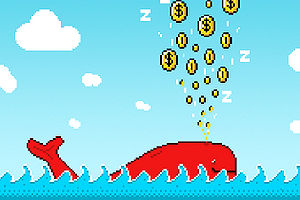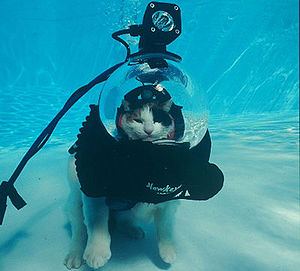One:Cetaceans: Difference between revisions
mNo edit summary |
mNo edit summary |
||
| Line 2: | Line 2: | ||
The Cetaceans have always been rumored to be of high intelligence. After the [[One:Batavia_Excession|Batavia Excession]], this was discovered to be conditionally true. Cetaceans actually distribute and share their knowledge telepathically, such that no individual Cetacean can be said to instantaneously recall more than (the equivalent of) a few bawdy knock-knock jokes or solve more than (the equivalent of) a basic antiderivative. This is why, although Cetaceans prefer a more solitary life, they will form loose communities such as that of [[One:Chicago-Under-The-Sea|Chicago-Under-The-Sea]]: proximity speeds their telepathy, and thus their creative, calculative, and commodifying abilities. | The Cetaceans have always been rumored to be of high intelligence. After the [[One:Batavia_Excession|Batavia Excession]], this was discovered to be conditionally true. Cetaceans actually distribute and share their knowledge telepathically, such that no individual Cetacean can be said to instantaneously recall more than (the equivalent of) a few bawdy knock-knock jokes or solve more than (the equivalent of) a basic antiderivative. This is why, although Cetaceans prefer a more solitary life, they will form loose communities such as that of [[One:Chicago-Under-The-Sea|Chicago-Under-The-Sea]]: proximity speeds their telepathy, and thus their creative, calculative, and commodifying abilities. | ||
[[File:whale.jpg|300px|thumb | [[File:whale.jpg|300px|thumb|Stylized depiction of the founding of Chicago-Under-The-Sea]] | ||
Sustenance fishing and tourism roles (performance) remain the largest components of the post-Batavian Cetacean economy, although a growing percentage of the Cetacean population are taking on service-oriented positions as butlers and nannies to nonconspecific employers. The [[One:Omicron_Exocron_Five_Corporation|Omicron Exocron Five Corporation]] (in league with aspiring Cetacean industrial leaders and the AFL-CIO-CAAT) have recently begun demanding a greater role for Cetacean workers in welding/repair efforts related to the Buryatia-Patagonia Transverse. It is suspected that members affiliated with these organizations are behind the Radio Radio Strikes. | Sustenance fishing and tourism roles (performance) remain the largest components of the post-Batavian Cetacean economy, although a growing percentage of the Cetacean population are taking on service-oriented positions as butlers and nannies to nonconspecific employers. The [[One:Omicron_Exocron_Five_Corporation|Omicron Exocron Five Corporation]] (in league with aspiring Cetacean industrial leaders and the AFL-CIO-CAAT) have recently begun demanding a greater role for Cetacean workers in welding/repair efforts related to the Buryatia-Patagonia Transverse. It is suspected that members affiliated with these organizations are behind the Radio Radio Strikes. | ||
[[File:CAAT.jpg|300px|thumb | [[File:CAAT.jpg|300px|thumb|A CAAT welder on his way to work]] | ||
Revision as of 10:22, 23 September 2012
Cetaceans comprise a category of marine mammals traditionally including such non-human animals as whales, porpoises, and dolphins. In recent years, however, the expansion of this category has been heavily lobbied by well-organized groups of gillers and CAATs (computer-assisted aquatic toygers).
The Cetaceans have always been rumored to be of high intelligence. After the Batavia Excession, this was discovered to be conditionally true. Cetaceans actually distribute and share their knowledge telepathically, such that no individual Cetacean can be said to instantaneously recall more than (the equivalent of) a few bawdy knock-knock jokes or solve more than (the equivalent of) a basic antiderivative. This is why, although Cetaceans prefer a more solitary life, they will form loose communities such as that of Chicago-Under-The-Sea: proximity speeds their telepathy, and thus their creative, calculative, and commodifying abilities.
Sustenance fishing and tourism roles (performance) remain the largest components of the post-Batavian Cetacean economy, although a growing percentage of the Cetacean population are taking on service-oriented positions as butlers and nannies to nonconspecific employers. The Omicron Exocron Five Corporation (in league with aspiring Cetacean industrial leaders and the AFL-CIO-CAAT) have recently begun demanding a greater role for Cetacean workers in welding/repair efforts related to the Buryatia-Patagonia Transverse. It is suspected that members affiliated with these organizations are behind the Radio Radio Strikes.

